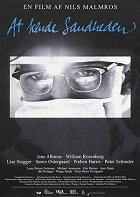Director:
Nils MalmrosGuión:
John MogensenCámara:
Jan WeinckeMúsica:
Gunner Møller PedersenReparto:
Jens Albinus, Ida Dwinger, Jon Lange, Stig Hoffmeyer, Lars Lunøe, Birthe Neumann, Vibeke Ankjær, Kim Sønderholm, Peter Schrøder, Elin Reimer, Anders Hove (más)Sinopsis(1)
Facing the Truth is fiction but it is deeply rooted in a personal portrait of Nils Malmros's father, Richard Malmros, one of the founding fathers of neurosurgery in Denmark. It spans much of the last century and reveals a fascinating life story: a doctor struggling with his surroundings, and a man struggling with his perfectionism and unwillingness to compromise.
Facing the Truth is about honesty and lies, ambition and sticking to one's principles: it is the account of a man who tries to do the right thing and achieves success in doing so but nevertheless ends up as the victim of his own moral principles. The film is a frame story that opens in recent times when the eighty-year-old neurosurgeon is confronted by a series of deaths caused by Thorotrast, a contrast medium for X-ray examinations he used around the end of the Second World War. Emerging from the frame story in which the father is helped by his son to review the old patient files, the narrative goes back in time to become an account of a whole life. Richard passed through the harsh school of life as a child, suffering the humiliation of being evicted by the bailiff from his home in the crisis-ridden fishing port of Esbjerg during the First World War. Eleven-year-old Richard helped his family to survive by working as an errand boy for the "Hope" Laundry, owned by his fanatically evangelical Aunt Johanne. He learned the meaning of diligence, developing a frame of mind that later meant a life of duty and self-denial. He was a loner at school and so he was bullied, but learned the dreadful consequences of betraying a friend through moral misapprehension.
When he became a young medical student in Copenhagen some of the social and moral pressure was relieved but now he was driven by his own scientific ambition. More or less inadvertently he found himself tied to Eli, his wife-to-be and the daughter of the medical superintendent from Esbjerg. However, it was his good fortune that her sunny disposition enabled her to live with such a complicated husband. During the Second World War he was appointed the first head of the new department of neurosurgery in Århus, Denmark's second city. By then he had also acquired a stable private life with a wife and children, so all the ingredients of a harmonious existence were in place. But at that very moment he ran into a serious crisis, falling out professionally with one of his closest colleagues. In his old age Richard Malmros witnessed tumours developing in patients once examined using Thorotrast. As Malmros puts it, "It is a terrible thought that every time we saved a patient's life we sowed the seeds of a cancer".
Facing the Truth is a tragic, profound account, delivered in Nils Malmros's familiar style and tone. At the same time it is a piece of history. However, by comparison with his earlier films, more emphasis is given to the external drama, not least due to his father's profession as a neurosurgeon. Despite the serious themes addressed, the film is full of humour and warmth, represented in particular by Eli, who in the midst of the worst crisis and in the evening of her life is nevertheless able to proclaim: "The happy days of old age — Ne'er will they return!" (texto oficial de la distribuidora)
(más)